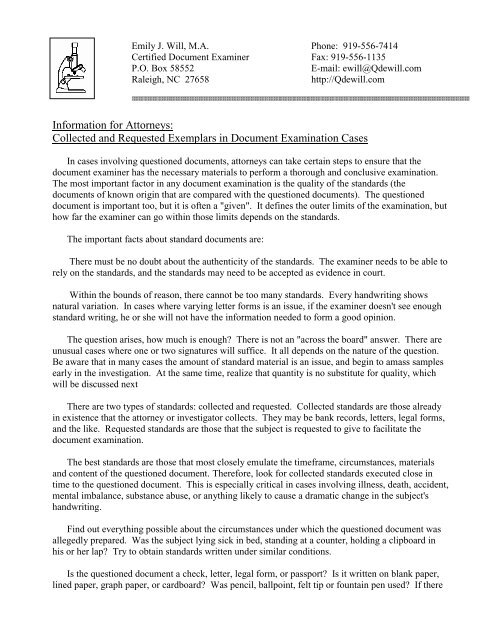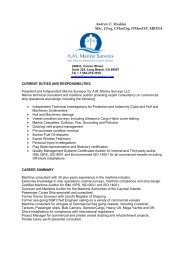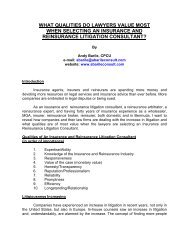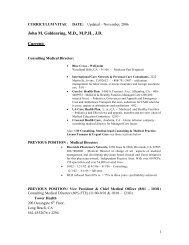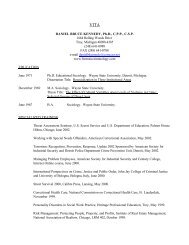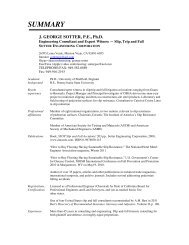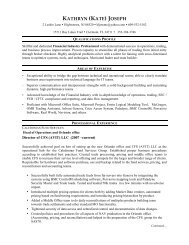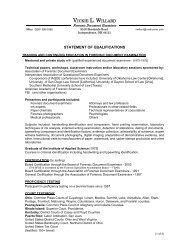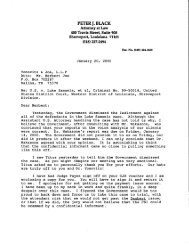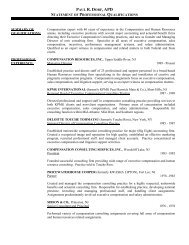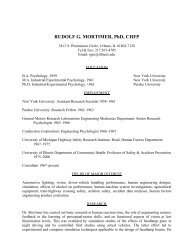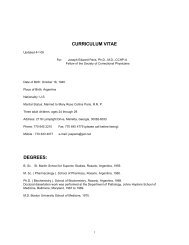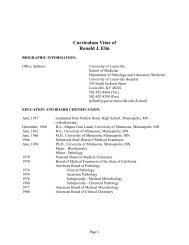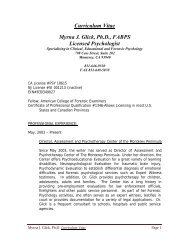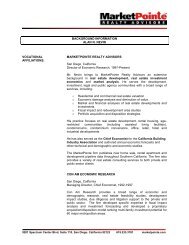Collected and Requested Exemplars in Document ... - JurisPro.com
Collected and Requested Exemplars in Document ... - JurisPro.com
Collected and Requested Exemplars in Document ... - JurisPro.com
Create successful ePaper yourself
Turn your PDF publications into a flip-book with our unique Google optimized e-Paper software.
Emily J. Will, M.A. Phone: 919-556-7414<br />
Certified <strong>Document</strong> Exam<strong>in</strong>er Fax: 919-556-1135<br />
P.O. Box 58552<br />
E-mail: ewill@Qdewill.<strong>com</strong><br />
Raleigh, NC 27658<br />
http://Qdewill.<strong>com</strong><br />
Information for Attorneys:<br />
<strong>Collected</strong> <strong>and</strong> <strong>Requested</strong> <strong>Exemplars</strong> <strong>in</strong> <strong>Document</strong> Exam<strong>in</strong>ation Cases<br />
In cases <strong>in</strong>volv<strong>in</strong>g questioned documents, attorneys can take certa<strong>in</strong> steps to ensure that the<br />
document exam<strong>in</strong>er has the necessary materials to perform a thorough <strong>and</strong> conclusive exam<strong>in</strong>ation.<br />
The most important factor <strong>in</strong> any document exam<strong>in</strong>ation is the quality of the st<strong>and</strong>ards (the<br />
documents of known orig<strong>in</strong> that are <strong>com</strong>pared with the questioned documents). The questioned<br />
document is important too, but it is often a "given". It def<strong>in</strong>es the outer limits of the exam<strong>in</strong>ation, but<br />
how far the exam<strong>in</strong>er can go with<strong>in</strong> those limits depends on the st<strong>and</strong>ards.<br />
The important facts about st<strong>and</strong>ard documents are:<br />
There must be no doubt about the authenticity of the st<strong>and</strong>ards. The exam<strong>in</strong>er needs to be able to<br />
rely on the st<strong>and</strong>ards, <strong>and</strong> the st<strong>and</strong>ards may need to be accepted as evidence <strong>in</strong> court.<br />
With<strong>in</strong> the bounds of reason, there cannot be too many st<strong>and</strong>ards. Every h<strong>and</strong>writ<strong>in</strong>g shows<br />
natural variation. In cases where vary<strong>in</strong>g letter forms is an issue, if the exam<strong>in</strong>er doesn't see enough<br />
st<strong>and</strong>ard writ<strong>in</strong>g, he or she will not have the <strong>in</strong>formation needed to form a good op<strong>in</strong>ion.<br />
The question arises, how much is enough? There is not an "across the board" answer. There are<br />
unusual cases where one or two signatures will suffice. It all depends on the nature of the question.<br />
Be aware that <strong>in</strong> many cases the amount of st<strong>and</strong>ard material is an issue, <strong>and</strong> beg<strong>in</strong> to amass samples<br />
early <strong>in</strong> the <strong>in</strong>vestigation. At the same time, realize that quantity is no substitute for quality, which<br />
will be discussed next<br />
There are two types of st<strong>and</strong>ards: collected <strong>and</strong> requested. <strong>Collected</strong> st<strong>and</strong>ards are those already<br />
<strong>in</strong> existence that the attorney or <strong>in</strong>vestigator collects. They may be bank records, letters, legal forms,<br />
<strong>and</strong> the like. <strong>Requested</strong> st<strong>and</strong>ards are those that the subject is requested to give to facilitate the<br />
document exam<strong>in</strong>ation.<br />
The best st<strong>and</strong>ards are those that most closely emulate the timeframe, circumstances, materials<br />
<strong>and</strong> content of the questioned document. Therefore, look for collected st<strong>and</strong>ards executed close <strong>in</strong><br />
time to the questioned document. This is especially critical <strong>in</strong> cases <strong>in</strong>volv<strong>in</strong>g illness, death, accident,<br />
mental imbalance, substance abuse, or anyth<strong>in</strong>g likely to cause a dramatic change <strong>in</strong> the subject's<br />
h<strong>and</strong>writ<strong>in</strong>g.<br />
F<strong>in</strong>d out everyth<strong>in</strong>g possible about the circumstances under which the questioned document was<br />
allegedly prepared. Was the subject ly<strong>in</strong>g sick <strong>in</strong> bed, st<strong>and</strong><strong>in</strong>g at a counter, hold<strong>in</strong>g a clipboard <strong>in</strong><br />
his or her lap? Try to obta<strong>in</strong> st<strong>and</strong>ards written under similar conditions.<br />
Is the questioned document a check, letter, legal form, or passport? Is it written on blank paper,<br />
l<strong>in</strong>ed paper, graph paper, or cardboard? Was pencil, ballpo<strong>in</strong>t, felt tip or founta<strong>in</strong> pen used? If there
was anyth<strong>in</strong>g unusual about the materials of the questioned document, try to duplicate that<br />
uniqueness <strong>in</strong> the st<strong>and</strong>ards.<br />
Content can be important <strong>in</strong> a document exam<strong>in</strong>ation. Look for collected st<strong>and</strong>ards that share<br />
letter <strong>com</strong>b<strong>in</strong>ations, words, phrases or numbers with the questioned document. When request<strong>in</strong>g<br />
st<strong>and</strong>ards prepare a text that will <strong>in</strong>clude such similar content.<br />
There is a method for obta<strong>in</strong><strong>in</strong>g good requested st<strong>and</strong>ards. In a h<strong>and</strong>writ<strong>in</strong>g case the material to<br />
be written should be dictated to the subject, rather than copied by the subject. Prepare the text <strong>and</strong><br />
assemble the proper materials. Have on h<strong>and</strong> blank paper <strong>and</strong> any necessary forms <strong>and</strong> a selection of<br />
writ<strong>in</strong>g <strong>in</strong>struments. The subject may provide a pen or pencil <strong>and</strong> should be allowed to use it for the<br />
first writ<strong>in</strong>g sample.<br />
Have the subject do some free writ<strong>in</strong>g to loosen up. Then dictate the material at a reasonable<br />
speed. Do not give any help with spell<strong>in</strong>g or punctuation. Have the subject sign <strong>and</strong> date the sample.<br />
Take the sample <strong>and</strong> set it aside out of view. After some general conversation, ask the subject to<br />
repeat the task. This is a good time to request that the subject use a different paper or writ<strong>in</strong>g<br />
<strong>in</strong>strument if appropriate.<br />
Dictate a bit faster the second time. More repetitions may or may not be needed. If you are<br />
especially <strong>in</strong>terested <strong>in</strong> st<strong>and</strong>ard signatures, prepare several forms or blanks with the same layout as<br />
the questioned document for the subject to sign. Have the subject sign these forms one at a time. A<br />
column of signatures on a s<strong>in</strong>gle sheet of paper may be useful if it appears <strong>in</strong> conjunction with several<br />
other types of st<strong>and</strong>ards, but by itself is not the best st<strong>and</strong>ard for exam<strong>in</strong>ation. A column of ten<br />
signatures written this way tends to be<strong>com</strong>e ten copies of one signature rather than ten dist<strong>in</strong>ct<br />
signatures.<br />
Depend<strong>in</strong>g on the questioned document, it may be important to request that the subject write <strong>in</strong><br />
pr<strong>in</strong>ted or cursive form. Also, it may be necessary to request samples written with the unaccustomed<br />
("wrong") h<strong>and</strong>.<br />
Number the samples so that the document exam<strong>in</strong>er will be aware of the order of th<strong>in</strong>gs, <strong>and</strong> keep<br />
a separate anecdotal record of anyth<strong>in</strong>g unusual that happens dur<strong>in</strong>g the session.<br />
H<strong>and</strong>le all documents carefully. Do not fold documents - even those already folded. Repeated<br />
fold<strong>in</strong>g <strong>and</strong> unfold<strong>in</strong>g of documents can cause damage <strong>and</strong> obscure that which needs to be exam<strong>in</strong>ed.<br />
The best way to h<strong>and</strong>le, transport <strong>and</strong> store documents is unfolded <strong>and</strong> <strong>in</strong> archivally safe covers away<br />
from strong light <strong>and</strong> moisture. If any change is made to a document (staples removed, an accidental<br />
tear, etc) a note should be made (but not on the document).<br />
<strong>Document</strong> exam<strong>in</strong>ations often beg<strong>in</strong> with, <strong>and</strong> even end with, photocopies. When possible, keep<br />
track of the generation of any copy made. With each successive copy some loss of detail <strong>and</strong><br />
addition of superfluous mark<strong>in</strong>gs can occur. Sometimes a good op<strong>in</strong>ion can be formed based on<br />
photocopies <strong>and</strong> sometimes it cannot. Of course, orig<strong>in</strong>als are always preferred.<br />
Unless attorneys have been <strong>in</strong>volved <strong>in</strong> a questioned document case they often have no reason to<br />
th<strong>in</strong>k of the necessary precautions. Each po<strong>in</strong>t made here can be exp<strong>and</strong>ed <strong>and</strong> taken <strong>in</strong> several<br />
directions. The best way to assure good results is to contact the document exam<strong>in</strong>er early <strong>in</strong> the<br />
<strong>in</strong>vestigation <strong>and</strong> work with the exam<strong>in</strong>er to plan an approach to the specific case.


